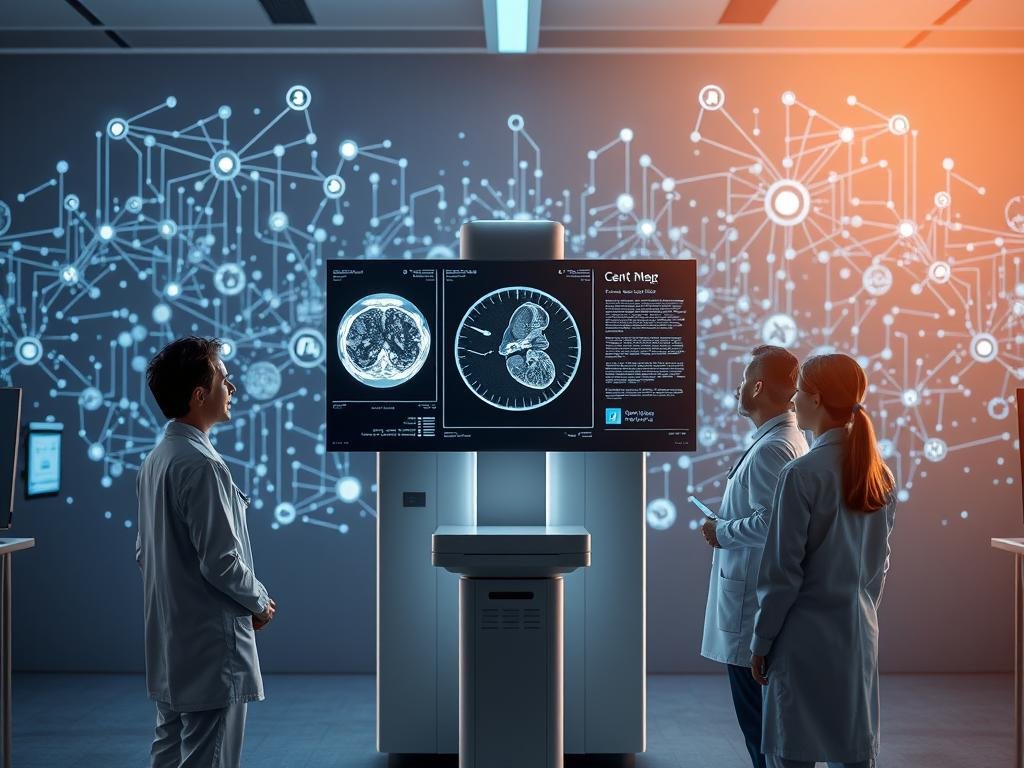You are surrounded by machine learning every day, often without even realizing it. From the personalized recommendations on your smartphone to the automated routines in your smart home devices, machine learning is changing how you live and interact with technology.
By 2025, over 30 billion devices will be connected worldwide. Many will use machine learning applications to make your life better. For example, smart home systems use IoT and machine learning for remote control, making your life easier.
As you go about your day, practical machine learning examples are working for you. They make adjustments and predictions to enhance your daily life. This technology is not just about making things easier. It’s about creating a more connected and efficient life for you.
Understanding Machine Learning Basics
To fully appreciate the advancements in technology, it’s vital to understand the basics of machine learning. Machine learning is a subset of artificial intelligence. It involves training algorithms to learn from data and make predictions or decisions. This foundational understanding will help you navigate the various applications of machine learning in different sectors.
What is Machine Learning?
Machine learning is a field of study that gives computers the ability to learn without being explicitly programmed. It enables systems to automatically improve their performance on a task based on experience, much like how humans learn from experience. For a deeper dive into machine learning, you can visit GeeksforGeeks for more resources.
Types of Machine Learning
There are several types of machine learning, each with its unique characteristics and applications:
- Supervised Learning: The algorithm is trained on labeled data to make predictions.
- Unsupervised Learning: The algorithm identifies patterns in unlabeled data.
- Reinforcement Learning: The algorithm learns through trial and error by interacting with an environment.
How Machine Learning Works
The process of machine learning involves several key steps:
- Data Collection: Gathering relevant data for training the algorithm.
- Data Preprocessing: Cleaning and preparing the data for use.
- Model Training: Using the data to train the machine learning model.
- Model Evaluation: Assessing the performance of the trained model.
- Deployment: Implementing the model in real-world applications.
By understanding these basics, you can better appreciate how machine learning is transforming various industries, from finance to healthcare. The applications of machine learning are vast and continue to grow as technology advances.
Machine Learning in Smartphones
Smartphones have become smarter thanks to machine learning. Now, you get better virtual assistants and personalized tips. This makes using your phone easier and more fun.
Virtual Assistants: Siri and Google Assistant
Siri and Google Assistant are key features in phones. They use machine learning to understand and act on voice commands. They can set reminders, tell you the weather, and more.
Image Recognition in Apps
Machine learning has also changed how apps work with images. Now, apps can recognize objects, people, and scenes. This helps with photo tagging and augmented reality.
This tech is also used in healthcare and security. It helps with better diagnostics and surveillance.
Personalized Recommendations
Machine learning gives you personalized tips in apps. It looks at what you like and suggests music, movies, or products. These suggestions aim to make your experience better.
For more on how machine learning boosts smartphones, read this Forbes article.
Machine learning makes your phone more useful and fun. As tech grows, we’ll see even more cool uses of machine learning in phones.
Smart Home Devices and Machine Learning
Machine learning in smart home devices is changing how we live. It makes our homes more convenient and efficient. These devices learn our habits and adjust to our needs, improving our lives.
Smart Thermostats and Energy Efficiency
Smart thermostats are a great example of machine learning in our homes. Devices like the Nest Learning Thermostat learn our temperature preferences. They adjust the temperature for us, saving energy and money.
These thermostats learn our schedules and preferences. They adjust the temperature automatically. This keeps our homes comfortable when we need it.
To learn more about smart home automation, visit this resource. It shows the latest advancements.
Voice-Controlled Smart Speakers
Voice-controlled smart speakers, like Amazon Echo and Google Home, are popular. They use machine learning to understand voice commands. This lets us control other devices, play music, or get information easily.
The more we use these speakers, the better they get. They learn our voices and preferences, giving us a personalized experience.
Security and Surveillance Systems
Machine learning also improves home security. Modern security cameras can tell the difference between friends and strangers. This is thanks to machine learning that analyzes footage.
This reduces false alarms and ensures we’re only notified when it matters. For more on smart home security, check out this article.
By adding machine learning to smart home devices, manufacturers make them better. They create a safer and more personalized home for us.
Healthcare Innovations with Machine Learning
The use of machine learning in healthcare is changing how we care for patients. It uses advanced algorithms and data analysis. This way, healthcare providers can give more precise and personalized care.

Predictive Analytics in Patient Care
Predictive analytics is a big deal in healthcare. It helps doctors predict what patients need and spot health risks early. For example, it can look at patient data to guess who might go back to the hospital. This lets doctors act fast.
A study on AI in Healthcare shows it’s working. It’s cutting down on hospital readmissions and improving patient results.
Diagnostic Tools and Imaging
Machine learning is also improving diagnostic tools and imaging. It can look at medical images like X-rays and MRIs. It finds problems and makes diagnoses faster and more accurately than doctors sometimes can.
- Improved accuracy in disease detection
- Enhanced image analysis capabilities
- Faster diagnosis and treatment planning
Personalized Medicine Approaches
Machine learning is also changing personalized medicine. It looks at genetic data, medical history, and lifestyle. This helps create treatment plans that fit each patient better. It leads to more effective care and better results.
“The future of healthcare lies in personalized medicine, and machine learning is the key to unlocking its full potentia.”
As machine learning grows, so will its role in healthcare. We can expect more innovations in patient care and treatment.
Machine Learning in E-commerce
Machine learning is changing e-commerce, making shopping better and safer. It helps with product suggestions and fraud detection. E-commerce sites use it to make shopping better, work more efficiently, and keep customers safe.
Product Recommendations and Upselling
Machine learning looks at what you buy and how you browse to suggest products. This makes shopping more fun and can lead to buying more. For example, Amazon suggests items based on what you’ve looked at and bought.
Machine learning in product suggestions has many benefits:
- It makes shopping more fun with items you might like
- It keeps customers coming back with a shopping experience just for them
- It helps sell more by suggesting related items
Chatbots for Customer Service
Chatbots, powered by machine learning, are changing how we get help online. They offer instant support for questions and help with buying things. For example, a chatbot can help you track your order or return a product.
Chatbots have many advantages:
- They’re always there to help, day or night
- They answer quickly, making customers happier
- They save money by doing routine tasks automatically
Fraud Detection Mechanisms
Machine learning is key in stopping fraud online. It looks for patterns in data to find fraud. For more on machine learning in different areas, check out Digital Vista Online.
Machine learning in fraud detection offers many benefits:
| Benefit | Description |
|---|---|
| Enhanced Security | It spots complex fraud patterns |
| Reduced False Positives | It’s better at not confusing real transactions with fraud |
| Real-time Detection | It catches fraud as it happens, saving money |
Transportation and Autonomous Vehicles
Machine learning is changing how we travel. It’s making ride-sharing apps and cars drive themselves better. This tech boosts efficiency, safety, and makes travel more enjoyable.
Ride-Sharing Apps and Machine Learning
Ride-sharing services like Uber and Lyft use machine learning a lot. These algorithms predict demand and manage drivers. They help find the best routes for drivers to pick up passengers.
Machine learning looks at past data and traffic to guess when and where to send drivers. This helps them plan better. You can learn more about this in this research paper.
GPS and Route Optimization
GPS and route optimization are key in modern travel. Machine learning looks at traffic, road conditions, and more to find the best paths. This makes trips shorter, saves fuel, and cuts down on pollution.
For example, Google Maps uses machine learning to give you traffic updates and suggest new routes to avoid jams.
Safety Features in Autonomous Cars
Safety is top priority in self-driving cars. Machine learning helps these cars see and react to their surroundings. They use sensors and cameras to spot obstacles and make safe choices.
Learning from real-world data makes these cars safer and more reliable over time.
As machine learning gets better, it will make travel smarter, safer, and more efficient. You’ll see new uses in ride-sharing, route planning, and self-driving cars. It’s changing how we get around.
Financial Services Utilizing Machine Learning
Machine learning is changing financial services for the better. It makes things more efficient, accurate, and helps in making better decisions. You might see improvements in credit scoring and automated trading systems.
Credit Scoring and Risk Assessment
Financial institutions use machine learning to better judge creditworthiness. They look at lots of data like credit history and spending habits. This helps predict if someone might not pay back a loan.
Enhanced credit scoring models can spot credit risks early. This lets lenders act fast. To learn more about machine learning in finance, check out this resource.
Automated Trading Systems
Automated trading systems use machine learning to analyze market data. They find patterns and make trades fast, something humans can’t do. These systems work all day, every day, and make decisions without emotions.
These systems use predictive models to forecast market changes. They adjust trading strategies based on these forecasts. This makes trading more efficient and can lead to better returns.
Customer Insights and Market Analysis
Machine learning is great for understanding customers and analyzing markets. It helps financial institutions know what customers want. This leads to better services and happier customers.
Machine learning also looks at market data to spot trends and predict future changes. This is key for creating good business plans and making smart investments.
Machine learning is more than just making things more efficient. It’s driving innovation in finance. As it keeps getting better, we’ll see even more advanced solutions for managing risks, serving customers, and analyzing markets.
Entertainment and Media Applications
Machine learning is changing how we enjoy entertainment without us even noticing. It’s making a big difference in the entertainment and media world. This change is making our experiences better on many platforms.
Streaming Services and Content Suggestions
Services like Netflix and Hulu use machine learning to suggest shows based on what you watch. This makes watching more fun and helps you find new things to watch.
Studies show that these personalized suggestions can make viewers more engaged by up to 75%. This shows how machine learning is key to streaming services’ success.
“The use of machine learning in streaming services has revolutionized how we consume media, making it more personalized and interactive.”
Automated Video Editing
Machine learning is also making video editing faster and easier. It can automatically edit videos, pick out important parts, and even suggest music that fits the video’s mood.
- Automated video editing software saves time and cuts costs.
- Machine learning looks at lots of data to find trends and patterns in videos.
| Feature | Traditional Video Editing | Automated Video Editing |
|---|---|---|
| Time Consumption | High | Low |
| Cost | High | Moderate to Low |
| Personalization | Limited | High |
Game Development Enhancements
Machine learning is making games better by creating more realistic worlds and characters. It also helps predict how players will act, making games more fun.
To learn more about AI’s impact on media and entertainment, check out LeewayHertz’s article on AI in media and entertainment.

As machine learning gets better, we’ll see even more cool uses in entertainment and media. This will make how we enjoy media even more exciting.
The Future of Machine Learning Applications
Machine learning is changing our lives in big ways. You can look forward to virtual assistants getting smarter and more part of our daily lives. They will become more intuitive and fit seamlessly into our routines.
Emerging Trends
Machine learning is changing how we use technology. It’s bringing us personalized suggestions and predictive tools. Expect to see more of it in healthcare, finance, and transportation.
AI Ethics and Development
AI ethics are key as machine learning grows. It’s important to make sure AI is transparent and accountable. This builds trust in these technologies. We must think about the ethics of machine learning to avoid biases and ensure fairness.
Preparing for a Machine Learning-Driven World
To get ready for a world led by machine learning, stay up-to-date with new trends. Knowing how machine learning works and its impact on society is vital. By focusing on AI ethics and responsible use, we can unlock machine learning’s full power.
FAQ
What is machine learning, and how does it work?
Machine learning is a part of artificial intelligence. It trains algorithms to learn from data. This way, machines can make predictions or decisions without being told how.
It uses statistical techniques to get better at tasks over time. This makes machines more skilled as they gain experience.
How is machine learning used in smartphones?
Smartphones use machine learning for cool features. For example, virtual assistants like Siri and Google Assistant. They also use it for image recognition and personalized recommendations.
These features make smartphones more intuitive and tailored to each user. It’s all about making your phone experience better.
What are the applications of machine learning in healthcare?
In healthcare, machine learning helps a lot. It’s used for predictive analytics in patient care. It also helps in making accurate disease detection tools.
Plus, it supports personalized medicine. These uses help improve patient care, make clinical workflows smoother, and cut costs.
How does machine learning enhance customer experience in e-commerce?
Machine learning boosts e-commerce by giving personalized product suggestions. It also improves customer service with chatbots. And it helps protect businesses from fraud.
These efforts help businesses build stronger customer relationships. They also improve the bottom line.
What is the role of machine learning in transportation?
Machine learning is key in transportation. It’s used for ride-sharing services and GPS. It also helps in developing safety features for self-driving cars.
These applications make transportation more efficient, safe, and convenient. It’s all about making travel better.
How is machine learning used in financial services?
In finance, machine learning is used for credit scoring and risk assessment. It’s also used for automated trading systems. And it helps analyze customer insights and market trends.
These uses help financial institutions make better decisions. They reduce risk and improve competitiveness.
What are the applications of machine learning in entertainment and media?
In entertainment and media, machine learning is used for personalized content suggestions. It’s also used for automated video editing and game development enhancements.
These applications create more engaging and immersive experiences. They make entertainment more fun for consumers.
What are the emerging trends in machine learning?
New trends in machine learning include reinforcement learning and AI ethics. There’s also a growing role in edge computing.
These trends will shape the future of machine learning. They will influence how it’s used in different industries.
How can individuals and societies prepare for a world where machine learning plays an increasingly significant role?
To prepare for a world with more machine learning, invest in education and retraining. Develop strong AI ethics frameworks. And encourage a culture of innovation and experimentation.
This way, we can enjoy the benefits of machine learning. We can also minimize its risks.






